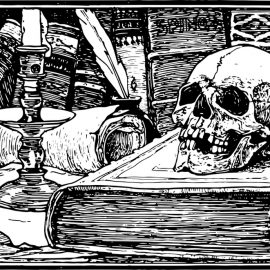

This article is an excerpt from the Shortform book guide to "Beyond Good and Evil" by Friedrich Nietzsche. Shortform has the world's best summaries and analyses of books you should be reading.
Like this article? Sign up for a free trial here.
What drives philosophers to create their influential works? How does a simple act like a rabbit eating grass connect to human creativity and ambition?
According to Friedrich Nietzsche, the will to power is an innate desire that drives all living beings to exercise strength and dominance. From basic survival instincts to complex human achievements, this force shapes how we interact with our environment and each other.
Continue reading to learn Nietzsche’s perspective on the hidden motivations behind philosophy, art, and even everyday actions.
Friedrich Nietzsche on the Will to Power
After showing that the search for objective truth is impossible, Nietzsche argues that philosophers don’t even want to find objective truth. In reality, they’re motivated by a subconscious desire to exercise power over others. We’ll discuss this desire—which Nietzsche calls the will to power—and how he applies it to philosophy.
According to Friedrich Nietzsche, the will to power is a hypothetical force that he describes as a living thing’s desire to exercise its strength on others and its environment. He suggests that the will to power is the basis for all living things’ behaviors, from simple acts of self-preservation to complex decision-making. For example, a rabbit eating grass exercises its strength by dominating the plant and impacting the ecosystem. In humans, the will to power inspires people to create, dominate others, and define themselves as unique individuals. An artist creating a painting exercises strength by influencing her peers with her art and impacting her society’s culture—while also defining her unique place within it.
| Influences on the Will to Power Nietzsche’s theory of the will to power draws inspiration from several major sources. First, 19th-century German philosopher Arthur Schopenhauer’s concept of the “will to live” significantly influenced Nietzsche. Schopenhauer argued that a blind, irrational force drives all life forms to perpetuate their existence. Nietzsche expanded this idea into the will to power’s drive for not just survival but also dominance and self-actualization. Nietzsche also drew from English scientist Charles Darwin’s theory of natural selection. According to Darwin, species evolve because some individuals have genes that make them better at surviving and reproducing. These individuals then reproduce more and pass on those beneficial genes to their offspring. Nietzsche saw the will to power—the desire to compete with others and win, outsurviving and out-reproducing them—as the underlying force driving natural selection and therefore evolution. |
Philosophy & the Will to Power
According to Nietzsche, philosophers are motivated by a subconscious will to power—specifically, their desire to exert power over knowledge. They create their works to impose their beliefs on others and shape society’s ideas of what’s moral, true, or wise in a way that benefits them. Nietzsche explains that this is why philosophy often reflects the personality of its author: Philosophers tend to shape intellectual discourse in a way that suits their strengths.
For example, 18th-century German philosopher Immanuel Kant’s works massively influenced how people understood and talked about philosophy. Nietzsche suggests that this influence offered Kant power over knowledge. His works convinced others to adopt his values, while people who were influenced by him or who engaged with his ideas had to adopt his precise, structured, and organized writing style. This made philosophical discourse overall better suited to Kant’s strengths.
(Shortform note: Many other philosophers argue similarly that philosophers use philosophy to exercise power, including left-wing thinkers like 20th-century French philosopher Michel Foucault. But Foucault and others take a more systematic approach, arguing that philosophy is just one of many ways that a dominant culture justifies and reinforces its power over people. This contrasts with Nietzsche’s more individualistic view: He believes that philosophers seek to exercise personal power through their work as opposed to exercising power on behalf of a broader system.)

———End of Preview———
Like what you just read? Read the rest of the world's best book summary and analysis of Friedrich Nietzsche's "Beyond Good and Evil" at Shortform.
Here's what you'll find in our full Beyond Good and Evil summary:
- Why Nietzsche believed the entire philosophical and religious canon is a collection of delusions
- Nietzsche’s theory of the will to power and what inspired it
- Nietzsche’s belief in subjective morality and his critique of Christian values






